Lisa Saylor, a domestic violence survivor, recalled going to her pastor years ago and telling him about the abuse she suffered at home.
“The pastor asked about specifics,” Saylor said. “I didn’t hide anything from him. And so, in his knowledge which was very limited, he brought my abuser — my husband — into the church office with me. And he said, ‘Here’s the problem. If you will submit more and make those children behave, we won’t have to have this conversation because it will stop.’
“I don’t blame him. He didn’t understand the dynamics,” she said of that pastor. “However, it could have gotten me killed.”
Saylor shared her story with a small group of pastors and members of the faith community who attended the Faith Voices of Southwest Missouri meeting last Thursday.
Janice Thompson, another survivor of domestic violence, and Jamie Willis, program coordinator at the Greene County Family Justice Center, also spoke at the meeting.
Their presentations were intended to educate pastors, who often counsel married couples, about the signs and dynamics of domestic violence.
“We believe it’s a conversation that the faith community needs to have,” said Justin Burnett, organizer with Faith Voices of Southwest Missouri. “We believe that the presentation — the very personal stories — will help educate faith leaders (and) counseling departments on how they can be good allies.”
Thompson’s ex-husband is in prison for assaulting his ex-girlfriend — and shooting the man she was with — on the Bass Pro shops parking lot in 2016. Thompson said she too had a negative experience when a pastor counseled her and her ex-husband to “work this out.”
Thompson said she takes issue when people of the faith community ask if she’s forgiven her ex-husband.
“We hear that a lot as victims, and I understand where it comes from,” Thompson said. “But all I heard was that I was hard and there was a reason why I got what I got, because I couldn’t forgive.
“If you are ever speaking to a victim and that word comes up,” she continued, “please make it be about forgiving ourselves first because we didn’t see the signs.”
Willis focused her presentation on what services are available for victims at the Family Justice Center and offered many times to provide training to other groups of pastors and/or entire congregations. She encouraged pastors to reach out to her personally or the Family Justice Center anytime they suspect abuse might be happening within a family or couple.
“Domestic violence is such a complex issue,” Willis said. “I mean, people go through years and years and years of training and still don’t know everything. So it’s okay for you to not know what to do, but you can just reach out. If you have someone sitting in your office that you are like, ‘I can see that there’s something going on. Let’s call somebody.’ You know, just make that phone call with them. Just reach out for help.”
Need help?
If you are in immediate danger, call 911.
Find resources for victims of domestic violence by visiting greenecountyfamilyjusticecenter.org or calling 417-874-2600.
Walk-ins are welcome 8:30 a.m. to 4 p.m. Monday through Friday. The Greene County Family Justice Center is located at 1418 E. Pythian St.
For after-hours assistance: Call the Harmony House/Victim Center’s 24-hour safe line at 417-864-SAFE (7233).
When pastors miss the clues
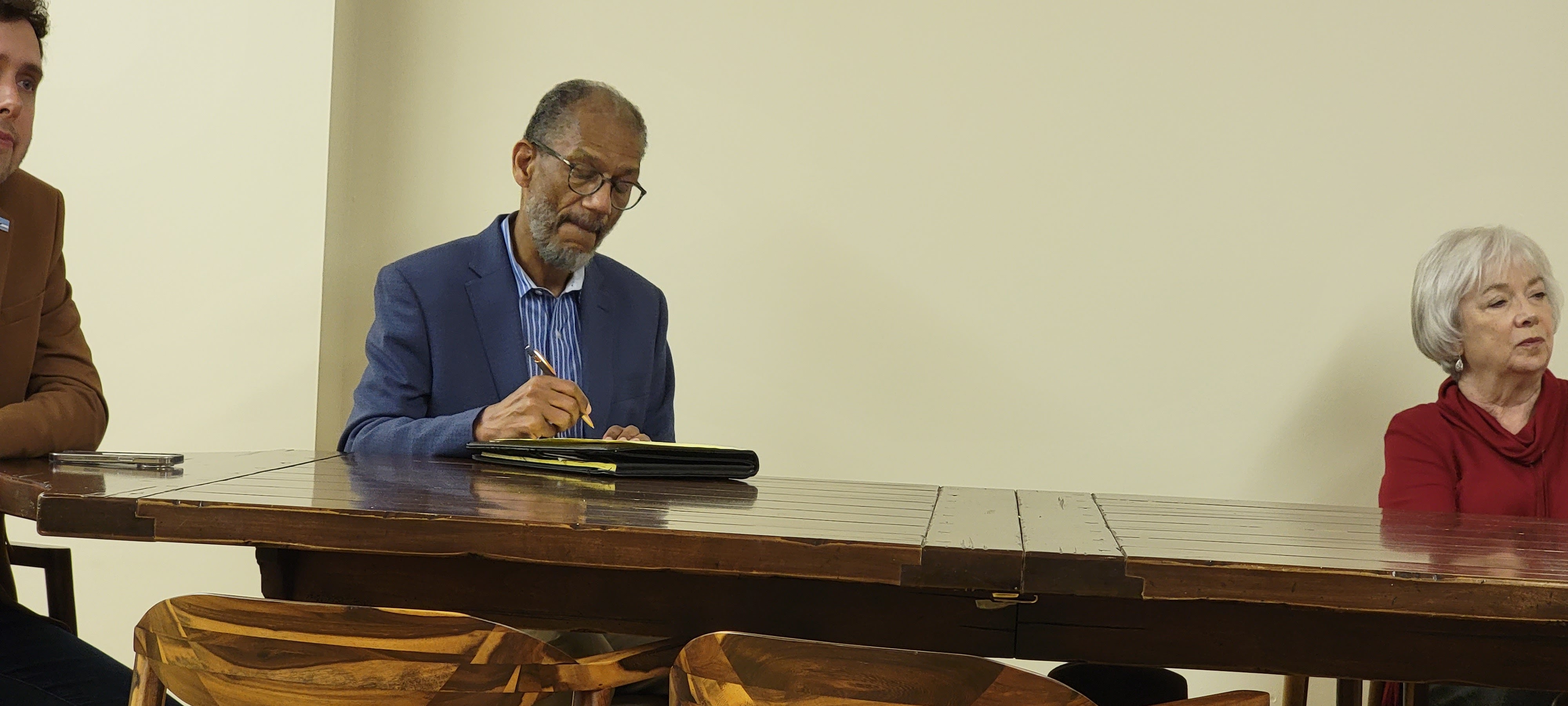
Throughout the meeting, attendees began talking about how the information could be shared with more pastors and faith leaders. Someone suggested the presentation be taught at local seminaries and bible colleges. Another said she planned to talk to the folks with Council of Churches of the Ozarks about the possibility of the presentation being shared at an upcoming meeting.
Rev. Darryl Gray, the executive director of Missouri Faith Voices, attended last week’s meeting. Obviously moved by the personal stories and information, Gray assured the presenters: “the seed has been planted, particularly for Faith Voices.”
Gray then shared a personal story about when he was a pastor in Montreal. Gray said he did eight sessions of premarital counseling with a young couple.
“Four years later, he killed her. And I wonder what I missed,” Gray said, putting his head down on the table. “To this day, I wonder what I missed. And so this is a trigger for me. I didn’t know what to expect driving up to Springfield. But I know what I need to do.”
Gray said he feels it’s important pastors are taught about the signs of domestic violence and how to help victims safely.
“The flags, they are not being taught,” he said. “Many pastors, particularly in my culture, send women back home.
“For me as a pastor and as a person who works with pastors, I guess we need more information,” Gray said. “We need a tool kit. We need something, because a lot of us don’t know.”
Willis told Gray that she is ready to help create that tool kit and provide the education and support.
“People have marital problems. And when they have marital problems, they go to their church,” Willis said. “And not all of those marital problems are domestic violence. But where there is power and control, isolation from family, isolation from friends — and so there are some signs that you can look for. There are questions that you can ask. I think it would be great if churches developed a domestic violence screening tool.”
Willis went on to talk about how supportive the faith community has been for the Family Justice Center. There are several churches the Center calls upon when it needs financial aid for things like rent deposits for victims who want to leave their abusers.
But just because they support the cause doesn’t mean they fully understand and recognize domestic violence.
“It’s harder when it’s in your church and you know both parties and you’ve only seen good, happy interactions with people,” Willis said. “They’re not going to come to you and say, ‘I was strangled last night.’ That’s not going to be the first thing that they tell you.”
Most likely victims will describe the situation like this, Willis said: “‘We’ve been having some difficulties at home. I’m not sure how to handle it. He gets really angry. I feel like I’m walking on eggshells.”
“That’s what you’re going to hear first. And so knowing where to go from there is the most important,” Willis said. “Because the first time that a survivor reaches out to you, if they don’t get what they need — and this is the part that is so painful — they won’t do it again.
“If we don’t help them the first time they reach out, we’re putting them in very dangerous situations,” she continued. “Watch for those types of keywords, because it’s always going to be worse than they’re telling.”
Domestic violence survivor, raised in church, taught to submit
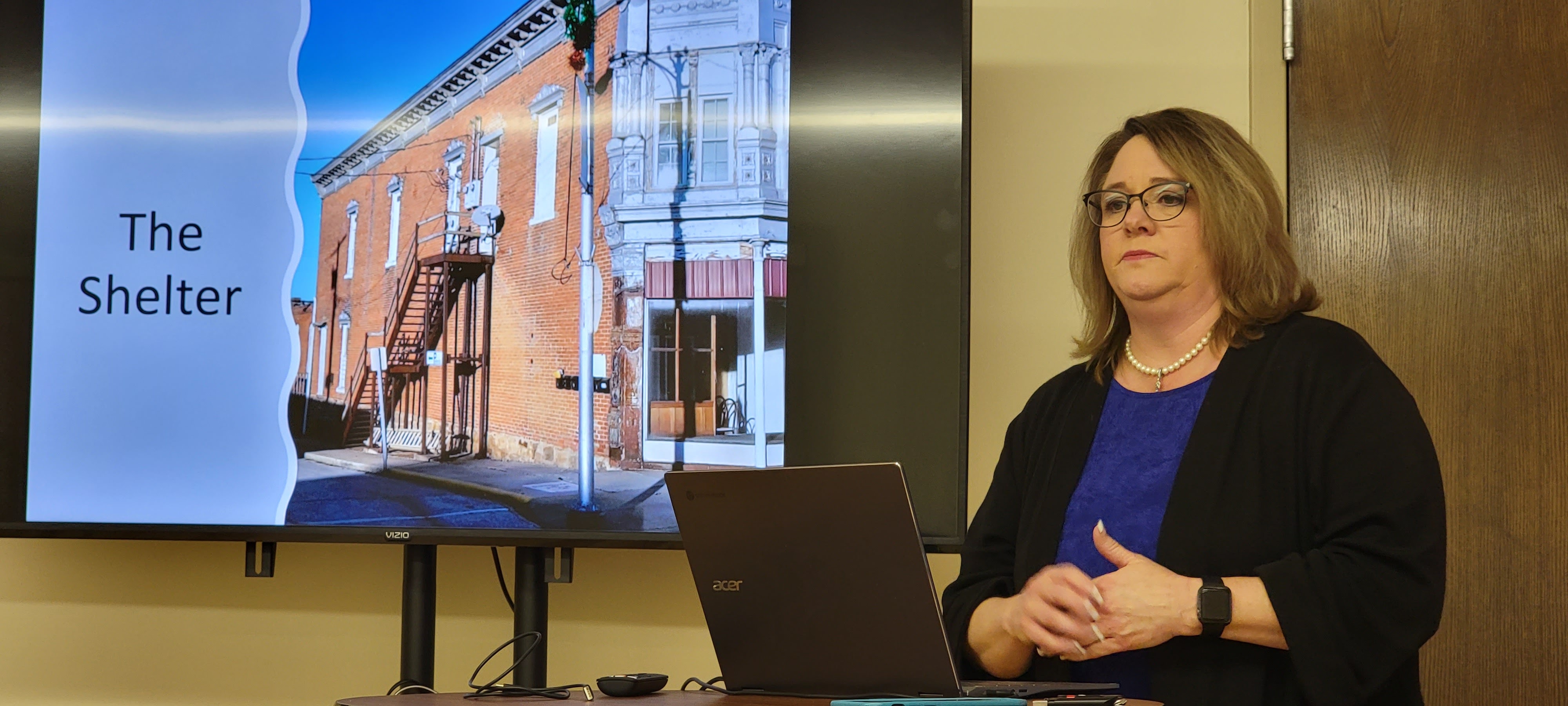
Though she left her abuser in 2011 and divorced him in 2012, Saylor said her ex-husband continued to stalk and harass her for years after.
In 2012, her ex was convicted of sexual misconduct. He now has to register as a sex offender for an assault on Saylor that occurred while she was a patient in a Springfield hospital.
He's violated orders of protection multiple times, resulting in seven probation violations, the News-Leader reported. On the eighth violation, the judge revoked his probation and sent him to prison for four years.
He was released in 2020.
Saylor, a woman with strong Christian beliefs, shared some of her personal experiences with the faith leaders who attended the meeting last week. She told them they could ask any questions and that “nothing is off limits.”
“I’m here as a survivor to let you dissect the brain of a victim/survivor so you understand kind of what goes on in our brains and the journey to survivor,” she said.
Saylor said her grandfather was an Assemblies of God minister for 62 years, which meant Saylor was “raised in church.”
“If we are of the faith community,” she said, “sometimes our belief system will often keep us anchored in because we have often been raised to have the understanding that our faith means submissiveness.”
She warned the pastors that just because a couple attends church every Sunday, that there couldn’t possibly be domestic violence happening at home.
“We like to hide our crazy. We get pretty darn good at it,” she said. “You may not even realize that you’re sitting next to us in Sunday school or you’re preaching right at us in that front row.”
Survivor describes how emotional abuse turned physical
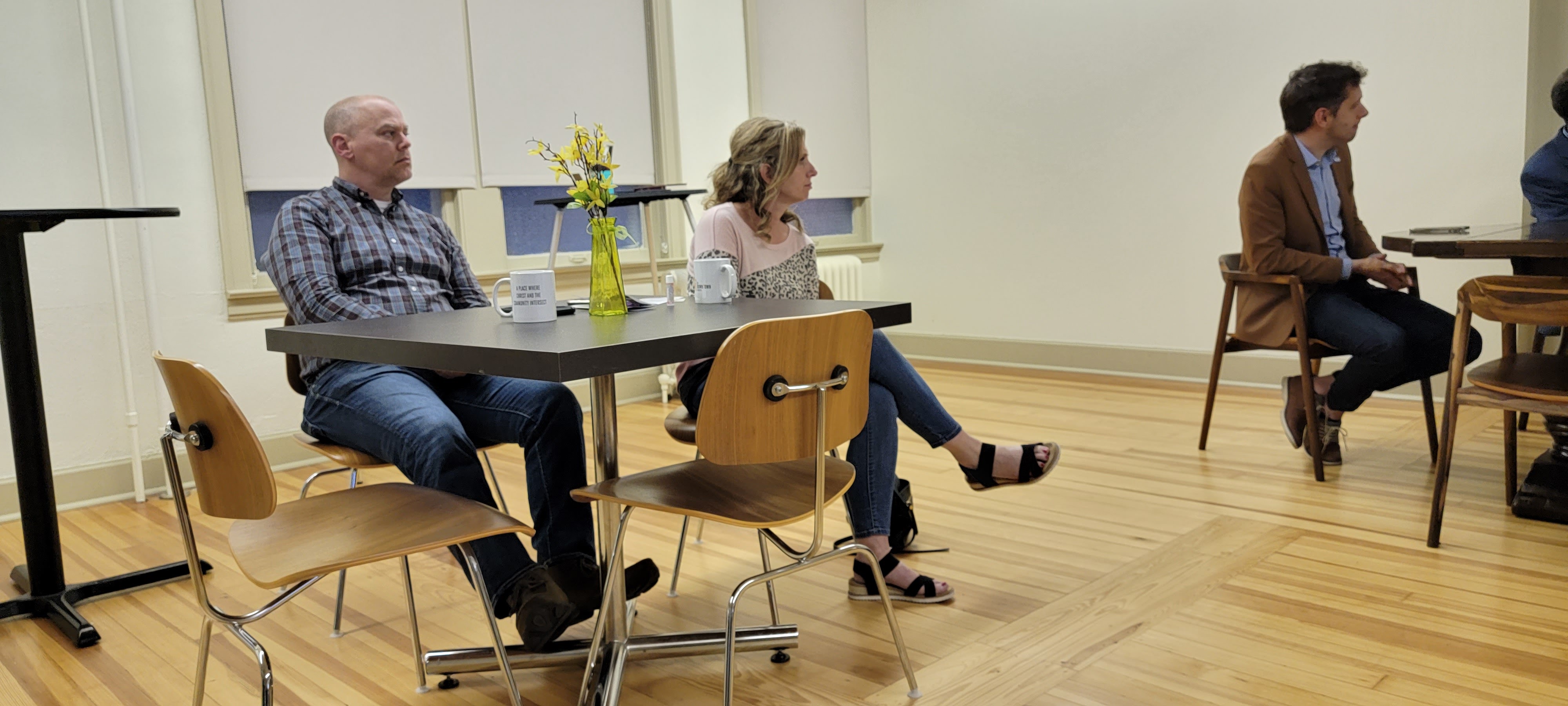
Thompson talked to the pastors about how her relationship with her ex-husband began. They were both young: she was 18 and he was 24.
She described it as a “whirlwind, quick romance.” She said she got pregnant and his parents had the wedding planned before she knew what was happening.
“I think it’s very important for people to understand that my abuse did not start when I met him,” she said. “That’s not ever how it starts. If they hit us on the first date, we’d be running.”
But over time, the isolation, manipulation — the power and control — crept into the relationship.
He had been married before and told Thompson that his first wife had cheated on him.
“He said his heart had been broken,” Thompson said. “He had trust issues and really needed to know where I was at all times.”
The couple had three sons and Thompson was a stay-at-home mom. Her ex controlled her finances and did his best to isolate her from friends and family.
“I was a good little housewife. He was in charge,” she said. “He isolated me, blamed me for any problems that we had: He would be further along in his career if I didn’t keep getting pregnant. Things like that.
“I thought abuse was only a physical hit,” Thompson said. “He was abusive from the beginning with all of the control.”
Then one night an old friend was in town, and they went on a “couples date.” She’s not sure what set him off that night, but Thompson said she knew he was angry with her.
“I went to bed. I didn’t want to argue. The following hours were a pretty brutal nightmare,” she said. “I was stripped naked because I would not run if I was naked. I was strangled, which we now know is one of the biggest signs of future homicide.”
Thompson said her ex-husband dragged her up and down the stairs and put her in the bathtub and poured cleaning products on her head. The News-Leader verified Thompson’s account of this evening through criminal and civil court documents in 2017.
At one point, he had her up against the wall and was choking her, so she scratched his face. When police arrived, he pointed to the scratches and claimed he was also a victim. Initially, they were both arrested.
“Imagine that shame of being a soccer mom who didn’t even have a speeding ticket on her record being arrested for domestic violence,” Thompson said. “It happens a lot.”
Thompson encouraged the pastors to not be fooled by someone who looks normal, has a good job or comes from a respectable family.
“You cannot tell by looks. They have all types of backgrounds. They are capable, functioning people. They can have friends, hold jobs,” she said. “They are usually perfectly sane people and are experts in manipulation. They will come to you and tell you that they are having trouble in their marriage, and they need you to help reach their victim.”
Family Justice Center can be a resource for pastors
The Greene County Family Justice Center is located at 1418 E. Pythian St., in the former Tefft school building.
Anyone experiencing any kind of abuse is welcome 8:30 a.m. to 4 p.m., Monday through Friday. No appointment is necessary, and there is no charge for services.
Willis gave the pastors her personal contact information as well as the main phone line to the center: 417-874-2600.
If someone has an after-hours need, the Victim Center and Harmony House share a 24-hour safe line: 417-864-SAFE (7233).
“I want to be a resource for you. I want to be able to talk to you about how you can talk to your congregations about domestic violence,” Willis told the pastors. “I want to talk to you about how we can support you if you have someone in your congregation that comes forward and says that they are a victim of domestic violence.”
Domestic violence doesn’t always mean physical abuse
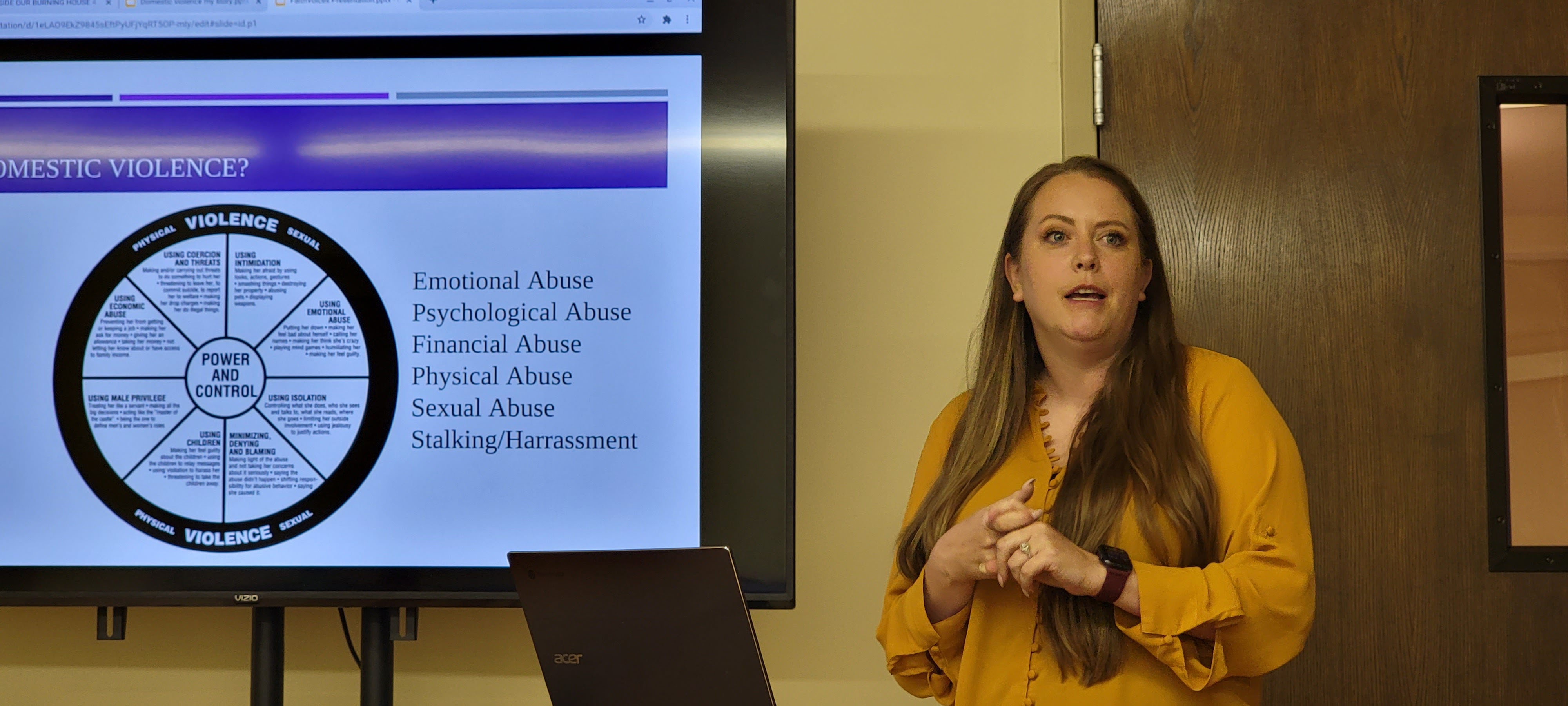
Willis explained more about the dynamics and signs of domestic violence, which doesn’t always mean “physical abuse.”
“A lot of times it ends up in physical abuse, but it starts as emotional abuse, psychological abuse, financial abuse. And then those things (physical abuse, sexual abuse, stalking and harassment) come later.
“It’s always about power and control. It’s always about trying to have control over your victim,” she said. “They use things like isolation, intimidation, coercion, threats to try to control their victim. And when that’s not working, the physical violence is what holds it all together. Sometimes that physical violence appears sooner than others. And sometimes you can be with someone for years before it ever results in physical violence.”
Help is available at the Family Justice Center even if physical violence hasn’t happened yet, Willis said.
What exactly does the Family Justice Center do?
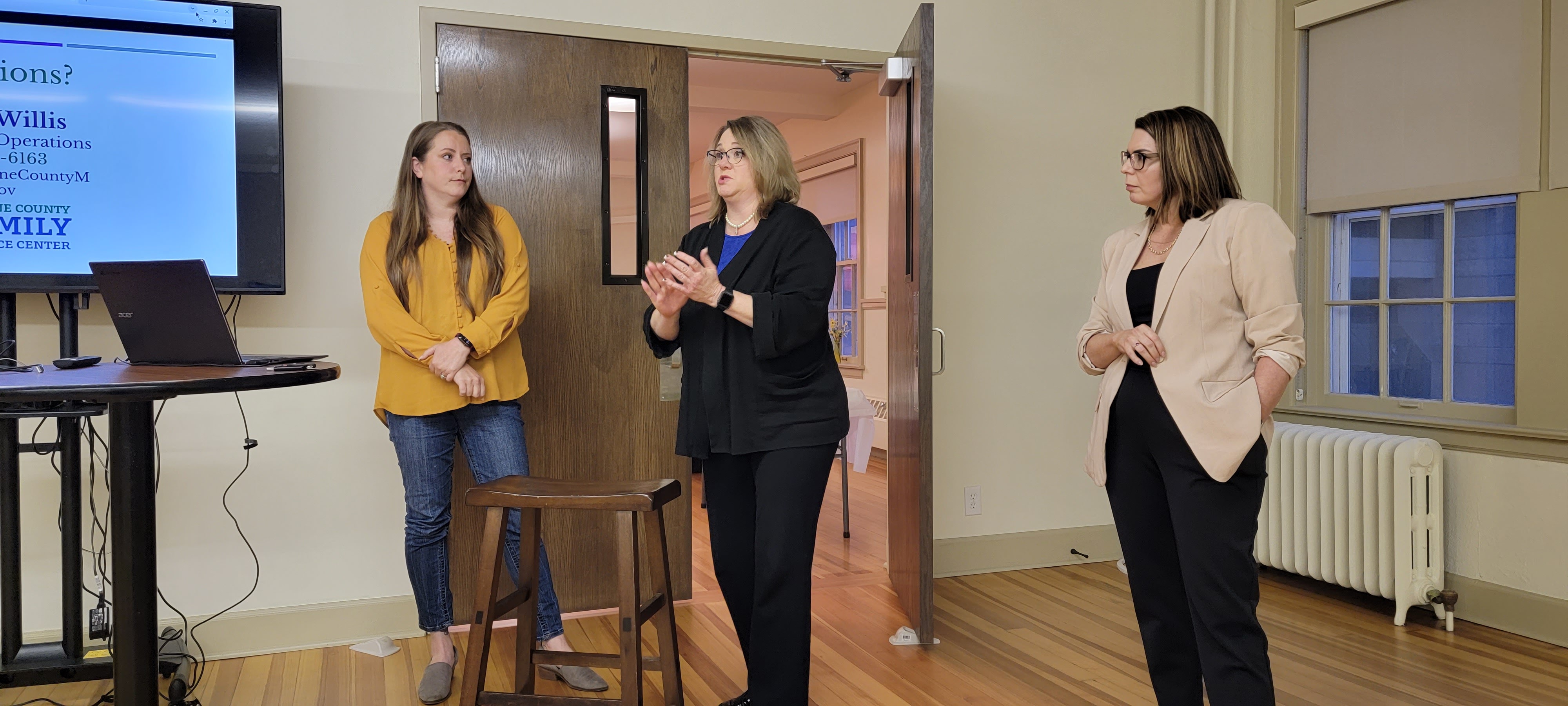
The Family Justice Center is often described as a one-stop shop for victims of abuse. Nine partner agencies have staff at the Center: Harmony House (Greene County’s only shelter for victims of domestic violence and their children), the Victim Center, Legal Services of Southern Missouri, Greene County Children’s Division, Springfield Police Department, Greene County Prosecutor’s Office, Greene County Sheriff’s Office, Burrell Behavioral Health and Child Support Office of Family Support Division.
“If someone needs help with divorce, child custody, orders of protection, we can do all that from the Family Justice Center. They don’t even have to go to the courthouse,” Willis said. “We house the domestic violence unit for the police department. So if someone wants to file a report, it’s completely up to them. But if they do, it will be with a domestic violence investigator who is very well trained in domestic violence, and an advocate will sit down with them to make sure that they have the support they need.”
The staff at the Center can help victims apply for Medicaid, food stamps and affordable housing, as well as get access to food or a safe shelter.
If a victim is ready to leave but has a pet, the Family Justice Center has a partnership with Rescue One to provide a confidential foster home for their animal.
Willis explained that when someone comes to the Family Justice Center, they meet with an advocate who helps them navigate what services they are interested in accessing.
“They do a risk assessment and safety planning, and then pull together a team of who that survivor wants to work with,” she said. “Maybe that involves a civil attorney. Maybe that involves (law) enforcement. Maybe they want to talk with Children’s Division about an ongoing case that they have or they don’t feel safe talking about that in their own home.
“All client information is confidential. So whenever they come in, they choose which partners receive that information, only the ones that they want to work with,” Willis told the pastors. “We don’t require someone to engage in the criminal justice system. So even if they plan to stay in their relationship, they may just want help talking through how to stay safe in their own home. We can help with that.”
Willis shared with the pastors several letters and notes from past clients, thanking the Center for helping them.
“For the last two years since we implemented our exit survey, we have 100 percent satisfaction from clients that come in,” she said. “We do really, really great work, and I’m really proud of that, so you can feel safe sending people to us.”

